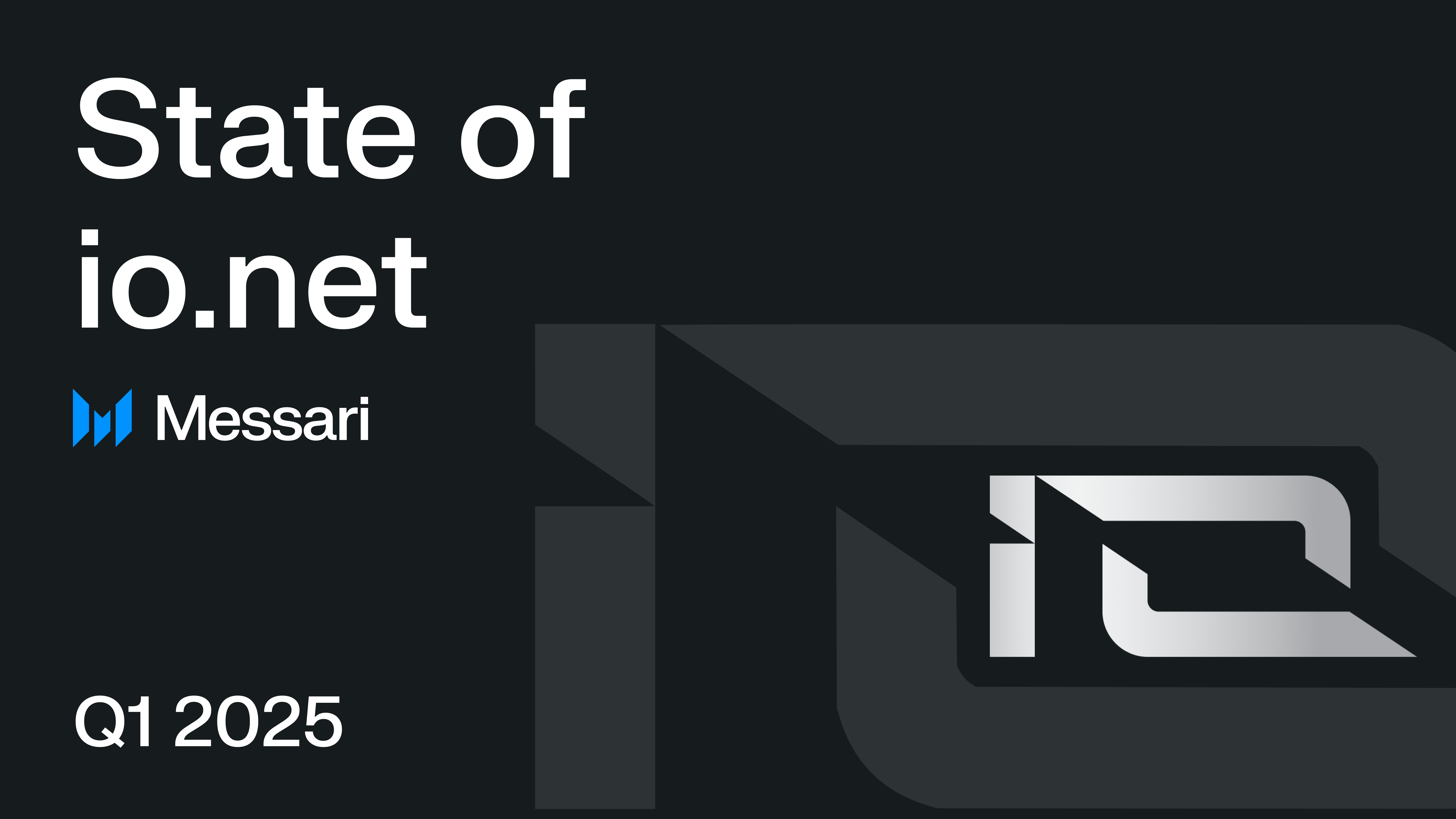Mizzle Secures $1M Investment from Onextel to Accelerate Decentralized Infrastructure Development
Monday, July 15, 2024 10:53 AM
467

Mizzle, a DePIN platform, has received a $1 million investment from tech investor Onextel to enhance its compute and storage platform. The funding will be used to improve platform capabilities, security features, and user experience. Mizzle’s technology combines AI-based DevOps, eBPF security, and advanced encryption to offer a secure and efficient decentralized infrastructure solution. The investment is expected to help Mizzle capture a significant share of the growing DePIN market.
Related News

2 days ago
io.net Reports Revenue Growth Amid Market ChallengesIn the latest quarterly report, io.net has demonstrated significant growth in revenue, achieving an impressive 82.6% increase, which brought its total revenue to $5.7 million. This surge in revenue is particularly noteworthy given the broader contraction in the cryptocurrency market, where the market cap of its IO token plummeted by 71.4% to $108 million, alongside a 74.9% drop in token price. Despite these challenges, io.net has successfully integrated with various AI and compute-focused platforms, including partnerships with Zerebro, KREA, and Injective, aimed at enhancing decentralized GPU compute capabilities for applications in AI and DeFi.
The infrastructure of io.net, which is built on a decentralized network of GPUs and CPUs, allows for scalable access to compute resources, particularly for machine learning and AI applications. The platform supports a wide array of machine learning frameworks, ensuring flexibility and efficiency in resource allocation. However, the average daily verified compute resources have seen a decline, with verified GPUs and CPUs down 11.1% and 4.5% respectively. This reduction reflects ongoing supply-side challenges and a decrease in token incentives, which has impacted the overall activity within the network.
Despite the mixed performance metrics, io.net has maintained a steady pace of development, with numerous collaborations aimed at expanding its ecosystem. The partnerships formed in Q1 2025, including those with Alpha Network and Mira Network, highlight io.net's commitment to enhancing decentralized AI infrastructure. As the project continues to refine its economic models and expand its network capabilities, it remains a key player in the evolving landscape of decentralized compute resources, even amid a challenging market environment.

2 days ago
Ben Goertzel: Pioneering Decentralized AI for a Better FutureBen Goertzel, a pioneer in artificial intelligence, has been advocating for decentralized AI since he wrote his first line of code 30 years ago. As the world stands on the brink of achieving Artificial General Intelligence (AGI), Goertzel emphasizes the importance of decentralization in ensuring that this powerful technology benefits humanity rather than serving centralized powers. At the recent Consensus conference in Toronto, he expressed optimism that AGI could be launched within the next one to three years through his project, SingularityNET, which aims to create a global marketplace for AI services. The project has made significant strides, including partnerships with Mind Network and Filecoin Foundation, a $53 million investment in a modular supercomputer, and a token merger with Ocean Protocol and Fetch.ai.
Goertzel's vision for decentralized AI is rooted in his early experiences with the internet, which he initially saw as a decentralized platform. However, he notes that the rise of tech giants like Google and Facebook has led to a more centralized internet, which undermines the foundational principles of decentralization. He argues that for AGI to be a force for good, it must be built on decentralized architecture from the outset. This philosophy is reflected in the design of SingularityNET, Hyperon, and the upcoming ASI Chain, which is tailored for decentralized AI applications. Goertzel believes that the trajectory of the post-AGI era will significantly differ based on the role of decentralized ecosystems in its development.
In addition to his work in AI, Goertzel has a history of exploring decentralized money concepts dating back to the 90s. Although he and his peers initially dismissed the practicality of decentralized transactions due to concerns over speed and cost, the emergence of Bitcoin has validated some of his early ideas. He humorously reflects on the missed opportunities of that era, acknowledging that their lack of business acumen prevented them from envisioning the darker applications of decentralized money. Today, Goertzel's commitment to decentralized AI continues to gain traction, positioning him and his initiatives as key players in the evolving landscape of technology and governance.

2 days ago
CUDOS Intercloud April Update: Record Growth and New InitiativesIn April, CUDOS Intercloud celebrated significant milestones and shared impressive metrics in its monthly update. The platform reported a record revenue of $204,505, alongside a remarkable 27% increase in GPU consumption, totaling over 300,000 hours. This growth reflects the rising demand for decentralized computing solutions, with more than 2 million GPU compute hours surpassed. CUDOS emphasized its commitment to transparency by providing real-time metrics on GPU capacity, VM deployment, user growth, and ecosystem spending, showcasing a clear distinction in cloud service delivery.
A notable highlight was the six-month anniversary of CUDOS's partnership with the Artificial Superintelligence Alliance (ASI). During this period, CUDOS has served over 15 million GPU hours and welcomed more than 30,000 users. The collaboration aims to build a decentralized compute layer that supports AI development without centralized bottlenecks. Additionally, CUDOS introduced "One Click Computing," allowing users to deploy AI stacks effortlessly, eliminating the complexities traditionally associated with AI deployment.
CUDOS also participated in the Ai2Peace initiative, focusing on using AI for global good. The platform's community rewards program concluded at the end of April, encouraging user engagement through referrals and feedback. Furthermore, CUDOS was represented at Paris Blockchain Week, where discussions highlighted the importance of permissionless compute access and the potential for blockchain to enhance AI's energy efficiency. As CUDOS continues to innovate and expand its offerings, it aims to foster a more sustainable and accessible computing environment for all users.

3 days ago
IoTeX Launches Staking Program on DePINscan to Enhance User Participation in DePIN EcosystemsOn May 21, 2025, IoTeX, a prominent Layer 1 blockchain designed for decentralized physical infrastructure networks (DePIN), officially launched its Staking Program on DePINscan. This unified staking interface aims to empower users by providing a simplified and trusted gateway to support and earn from innovative DePIN ecosystems. The program initially offers native staking support for Hivello and Functionland, both of which are incubated by IoTeX, along with integrated staking for other projects like Filecoin, Fluence, Swan, and Aethir, in partnership with technical collaborator Parasail.
The launch of the staking program is a significant milestone as it aligns with the maturation of DePIN from a nascent concept to a fully developed industry. Qevan Guo, CTO and Co-Founder of IoTeX, emphasized that this initiative facilitates scalable user participation in real-world infrastructure projects. DePINscan is not merely a dashboard; it represents a gateway to the future of Web3 utility, providing visibility into over 100 projects and an ecosystem value exceeding $1 billion. With the introduction of native and cross-chain staking, token holders can now easily delegate to real-world networks, track rewards, and support aligned DePIN projects.
The integration of high-profile projects like Filecoin and Aethir highlights IoTeX's commitment to fostering open collaboration and chain-agnostic support. All staking operations are secured by Parasail’s robust infrastructure, ensuring reliability and scalability for future partners. Dom Carosa, co-founder of Hivello, expressed enthusiasm about the staking program, noting it as a significant opportunity for users to engage with decentralized infrastructure intuitively and rewarding. IoTeX plans to continue onboarding new projects and providing extensive support through marketing, infrastructure tools, and cross-chain integrations, inviting developers and builders to join their staking program.

3 days ago
DeCloud Labs Proposes Final Migration from StackOS to StackAIDeCloud Labs has announced a significant shift in its focus from StackOS to StackAI, marking the end of support for the former and the beginning of a new chapter aimed at enhancing AI agents. After extensive discussions within the community, the company has decided to permanently close the migration process from StackOS to the new STKAI token on Solana. This decision comes in light of ongoing security concerns related to cross-chain bridges, particularly following the PolyNetwork hack, which prompted a reevaluation of their operational strategies. The migration period has provided StackOS token holders ample opportunity to convert their tokens, but the time has come to finalize this transition.
The proposal outlines the closure of bridge-based migrations and the establishment of a fixed supply of STKAI tokens, which aims to eliminate confusion surrounding token mintability. As of May 30, 2025, any unconverted STACKAI tokens will be airdropped as STKAI on Solana for those who opened support tickets prior to this date. However, any unclaimed tokens will be considered burned, thereby permanently removing them from circulation. This final step is intended to secure the integrity of the token supply and enhance clarity for both new and existing investors regarding the tokenomics of STKAI.
In conclusion, the DAO proposal emphasizes the importance of community engagement, allowing token holders to choose between remaining with StackOS or transitioning fully to StackAI. DeCloud Labs is committed to the development of StackAI moving forward, while also offering support to those interested in continuing the StackOS project. The final voting will take place across three instances to ensure all community members have the opportunity to participate, with the results communicated transparently to the community. This strategic move not only secures the future of STKAI but also addresses the pressing security risks associated with bridge infrastructures.

3 days ago
Alpha Liquid Fund Invests in $XNET Token Ecosystem to Transform Mobile ConnectivityAlpha Liquid Fund has announced a significant investment in the $XNET token ecosystem, reinforcing its commitment to innovative projects in the decentralized wireless (DeWi) sector. The XNET Foundation is at the forefront of transforming mobile connectivity by addressing the limitations of traditional network infrastructure. By utilizing blockchain technology on the Solana network, Citizens Broadband Radio Service (CBRS) spectrum, and Wi-Fi 6+, XNET empowers local builders to deploy LTE/5G or carrier-grade Wi-Fi in underserved areas. This community-driven approach not only reduces costs but also enhances scalability, offering resilient connectivity solutions that challenge conventional Mobile Network Operator (MNO) models.
Recently, XNET Mobile was recognized as an International Data Corporation (IDC) Innovator in DePIN for 2025. In April, the project achieved a notable milestone with a 16% increase in average daily data offload, showcasing its ongoing momentum. Wes Levitt, the Chief Investment Officer of Alpha Liquid Fund, emphasized the tangible impact of XNET, highlighting the consistent growth in data offload and the strong community support that fuels the network's progress.
Alpha Liquid Fund specializes in liquid digital assets, maintaining a 90-day liquidity threshold. The fund employs a rigorous fundamental research approach, investing in digital assets both on the open market and through OTC deals directly from crypto projects. By utilizing institutional hedging tools and diversifying across sectors and market caps, Alpha Liquid Fund aims to deliver strong returns with reduced volatility and risk compared to direct digital asset holdings. Meanwhile, the XNET Foundation continues to drive innovation in decentralized wireless networks, striving to create scalable and cost-effective mobile connectivity solutions globally.
Signup for latest DePIN news and updates